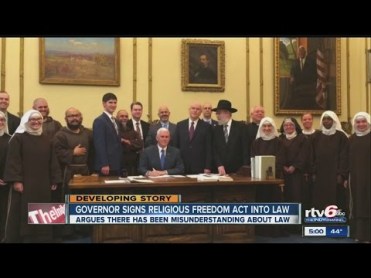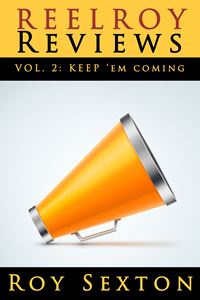
Indiana’s Gov. Mike Pence signs this (unnecessary) law in … private? Who invited the Mel Brooks movie extras?
Oh, Indiana, my Indiana … home of my upbringing and constant source of horrified bemusement and righteous indignation in my adulthood.
The latest and greatest affront to all creatures great and small in Indiana is the so-called “Religious Freedoms Restoration Act,” which, no matter how you want to spin the rhetoric, is intended to make the narrowly-defined, faith-based, mid-century (you pick the century) morality (?) of a bunch of Bible-thumping, pitchfork-wielding Hawthorne caricatures the law of that land wherever and whenever you try to go buy … baked goods?
And, yes, I’ve heard the rationalization that, “Well, all these other states had it, and Bill Clinton, the big ol’ dirty heathen, put this in place over 20 years ago at the Federal level, so why are Audra McDonald and Miley Cyrus and Angie’s List being so mean to us. We are just good Christian folks here.” Riiiight. And if Jimmy jumped down a well, would you all go, too? Please? There’s nothing nice about this legislation (or its timing); it is quite simply petty, spiteful, vindictive, and mean.
I had a Facebook “debate” with a soon-to-be-former Fort Wayne newscaster on another former Fort Wayne newscaster’s wall, and I ended my remarks thus, “If Indiana doesn’t want to LOOK bad, stop passing legislation like this that really only serves the purpose of MAKING INDIANA LOOK BAD. (Not to mention pandering to the blood lust of a certain fringe demographic to secure their future votes – the same people who claim to want ‘small government’.) And, yes, all those other places that have this legislation look bad too, but this is the freshest one. Congrats.”
To be clear, losing one’s cultural hegemony does not qualify as “persecution.”
(And don’t even get me started on the fun, wholesome family pastime of “pig wrestling” in Indiana and other states. Yes, that is a thing. Sadly. I can’t imagine this is what Jesus had in mind. Just sayin’. Oh, I do digress. This is a blog about movies, right?)
It is with this mindset last night that I set forth on a double feature of Neill Blomkamp’s Chappie and Robert Schwentke’s Insurgent. While neither film is Tolstoy, it is interesting how both traffic in themes of persecution, isolation, pogrom-like social mandate, and government and big business collusion run amuck.
Chappie, the more ambitious of the two, is directed by Blomkamp, who specializes in such Bradbury-esque allegory and class-warfare dystopia as District 9 (segregation) and Elysium (healthcare). With Chappie, he pilfers his narrative from a hodge podge of references: Oliver Twist, Pinocchio, Robocop, Short Circuit, 2001 to varying degrees of success.The plot is rather simple: a military-industrial complex (headed up by Sigourney Weaver at her most teutonic) is supplying Johannesburg (which must be the “new” Beirut in film) with a fresh supply of robot cops, who, in their emotionless, unrelenting style can put a steely hard thumb in the heart of crime. Her star employee (Dev Patel of Slumdog Millionaire) has invented the “robo-cops” but wants to introduce free-thinking sentience to the strange rabbit-eared creatures.
His rival at the company is Hugh Jackman being all “bad Hugh Jackman” … which basically means him glowering while saddled with a awful mullet haircut and Steve Irwin/Croc Hunter wardrobe choices. Crikey those shorts are short! Jackman’s character has created the Dick-Cheney-special of all robot law enforcement: something called the “moose,” a tank-like device that, in Jackman’s words, isn’t a “godless creature” (vis a vis the autonomous robo-cops) but is rather a machine that will be, um, super efficient at killing people … a lot of people. (I didn’t say the metaphor was subtle here, just appreciated.)
Patel ends up creating one robot with a winning personality – “Chappie” – a baby Energizer bunny who likes He-Man cartoons but gets in with the wrong crowd (a set of “gangsters” who make the acting work of Joe Pesci and Harvey Keitel seem subtle by comparison). Chappie causes all kinds of ruckus when Jackman realizes he can leverage Chappie’s very existence (and the uncontrollable nature of his robot brethren) to unleash discord and create the kind of violent societal conflict that makes people want to sign over any and all civil liberties. (See a pattern here?)
Chappie (the film) is interesting if a bit recycled/derivative, and it runs out of steam at the 2/3 mark. I grew very tired of Chappie’s family of thugs and would have enjoyed more development of the Patel/Jackman rivalry. Simplistic as it is, their characters’ implied debate of creator rights vs. created rights, independent thought vs. jack-booted control, authentic innovation vs. corporate profiteering is timely, frightening, and essential.
I would be remiss if I didn’t crow about Sharlto Copley’s stellar motion capture work as Chappie. His is the most fully-realized characterization in the film as our heart aches for this innocent, animal-esque creature desperately trying to survive and thrive and feel and love in a muddled world that he didn’t (nor wouldn’t) create. That performance is a keeper and likely deserves a more substantive film.
Insurgent continues in this near-future-there-but-for-the-grace-of-someone-goes-our-society vein. It is the second part of the young adult series Divergent, based on the books by Veronica Roth and starring Shailene Woodley and Theo James along with Kate Winslet, Miles Teller, Ashley Judd, Ansel Elgort, Jai Courtney, Maggie Q, Zoe Kravitz, and Octavia Spencer. Naomi Watts joins the fun this time as yet another mysteriously motivated, first-name only “faction leader” … actually make that “factionless” leader – the nomadic “Evelyn.”I noted in my review of Divergent (here) that, as young adult fantasy series go, this one is closest to something I can stand. It’s obviously not as popular as Hunger Games or Twilight, but, for me, it offers a more humane and humanistic look at our collective foibles.
Again, this ain’t deep stuff and it’s just as violent (if not more so) as those other series. However, the little socialist in my heart finds the central conceit of the Divergent books/movies very appealing: a culture that has decided to solve its problems by segregating its people along personality lines being rocked to its core when a young woman emerges who demonstrates exceptional abilities across the continuum of all those very traits (heaven forbid!). It’s not deep, but it’s feminist (lite), it’s inclusive, and it’s a wonderfully educational metaphor for young people to understand that a society is strengthened not weakened by diversity. Again, not subtle, but obviously much-needed right now.
Insurgent as a film feels like a bit of a placeholder as the series kicks into high gear with the upcoming final two installments, and that’s ok. Woodley has done stronger character work elsewhere, but those key moments where she needs to telegraph her utter frustration with her role as society’s new messiah are delivered with aplomb. That’s pretty much all she needs to do here.
James, still Anthony-Perkins-on-steroids, does a better job this time establishing that he isn’t just all smoldering petulance but that he has a heart and a brain. Winslet continues to be an icily bureaucratic delight as the calculating Jeanine, whose nefarious actions at every turn belie her hollow rhetoric for “peace and unity.” (Sound familiar?) Finally, Miles Teller mounts a much-needed charm offensive in this installment, no doubt realizing that this isn’t Ibsen and the dour delivery from everyone in the first film was a bit of a buzz kill. He is a charmingly oily sparkplug as the dubiously motivated Peter.
When one’s soul is at sea because the world and its leaders seem hellbent on plain meanness, it helps to see a couple of movies (even if they aren’t that terribly great) that reflect a point of view that some of us do see through this insidious crap in real time. The fact that hundreds of people might be like-minded enough to put together a film (or two) for the masses that might sow some seeds of popular dissent? Well, that’s the kind of balm I go to the movies to receive. It’s the end of the world as we know it … and I feel fine.
____________________________
Reel Roy Reviews is now TWO books! You can purchase your copies by clicking here (print and digital)
In addition to online ordering at Amazon or from the publisher Open Books, the first book is currently is being carried by Bookbound, Common Language Bookstore, and Crazy Wisdom Bookstore and Tea Room in Ann Arbor, Michigan and by Green Brain Comics in Dearborn, Michigan.
My mom Susie Duncan Sexton’s Secrets of an Old Typewriter series is also available on Amazon and at Bookbound and Common Language.

![Description: Film poster; Source: Wikipedia [linked]; Portion used: Film poster only; Low resolution? Sufficient resolution for illustration, but considerably lower resolution than original. Other information: Intellectual property by film studio. Non-free media use rationales: Non-free media use rationale - Article/review; Purpose of use: Used for purposes of critical commentary and illustration in an educational article about the film. The poster is used as the primary means of visual identification of this article topic. Replaceable? Protected by copyright, therefore a free use alternative won't exist.](https://reelroyreviews.files.wordpress.com/2015/03/chappie.jpg?w=202&h=300)
![Description: Film poster; Source: Wikipedia [linked]; Portion used: Film poster only; Low resolution? Sufficient resolution for illustration, but considerably lower resolution than original. Other information: Intellectual property by film studio. Non-free media use rationales: Non-free media use rationale - Article/review; Purpose of use: Used for purposes of critical commentary and illustration in an educational article about the film. The poster is used as the primary means of visual identification of this article topic. Replaceable? Protected by copyright, therefore a free use alternative won't exist.](https://reelroyreviews.files.wordpress.com/2015/03/insurgent.jpg?w=203&h=300)

![Description: Film poster; Source: Wikipedia [linked]; Portion used: Film poster only; Low resolution? Sufficient resolution for illustration, but considerably lower resolution than original. Other information: Intellectual property by film studio. Non-free media use rationales: Non-free media use rationale - Article/review; Purpose of use: Used for purposes of critical commentary and illustration in an educational article about the film. The poster is used as the primary means of visual identification of this article topic. Replaceable? Protected by copyright, therefore a free use alternative won't exist.](https://reelroyreviews.files.wordpress.com/2013/12/saving-mr-banks.jpg?w=202&h=300)
![Description: Film poster; Source: Wikipedia [linked]; Portion used: Film poster only; Low resolution? Sufficient resolution for illustration, but considerably lower resolution than original. Other information: Intellectual property by film studio. Non-free media use rationales: Non-free media use rationale - Article/review; Purpose of use: Used for purposes of critical commentary and illustration in an educational article about the film. The poster is used as the primary means of visual identification of this article topic. Replaceable? Protected by copyright, therefore a free use alternative won't exist.](https://reelroyreviews.files.wordpress.com/2013/12/jobs.jpg?w=202&h=300)
![Description: Film poster; Source: Wikipedia [linked]; Portion used: Film poster only; Low resolution? Sufficient resolution for illustration, but considerably lower resolution than original. Other information: Intellectual property by film studio. Non-free media use rationales: Non-free media use rationale - Article/review; Purpose of use: Used for purposes of critical commentary and illustration in an educational article about the film. The poster is used as the primary means of visual identification of this article topic. Replaceable? Protected by copyright, therefore a free use alternative won't exist.](https://reelroyreviews.files.wordpress.com/2013/12/the-way-way-back.jpg?w=202&h=300)
![Description: Film poster; Source: Wikipedia [linked]; Portion used: Film poster only; Low resolution? Sufficient resolution for illustration, but considerably lower resolution than original. Other information: Intellectual property by film studio. Non-free media use rationales: Non-free media use rationale - Article/review; Purpose of use: Used for purposes of critical commentary and illustration in an educational article about the film. The poster is used as the primary means of visual identification of this article topic. Replaceable? Protected by copyright, therefore a free use alternative won't exist.](https://reelroyreviews.files.wordpress.com/2013/12/vivien-leigh.jpg?w=300&h=300)